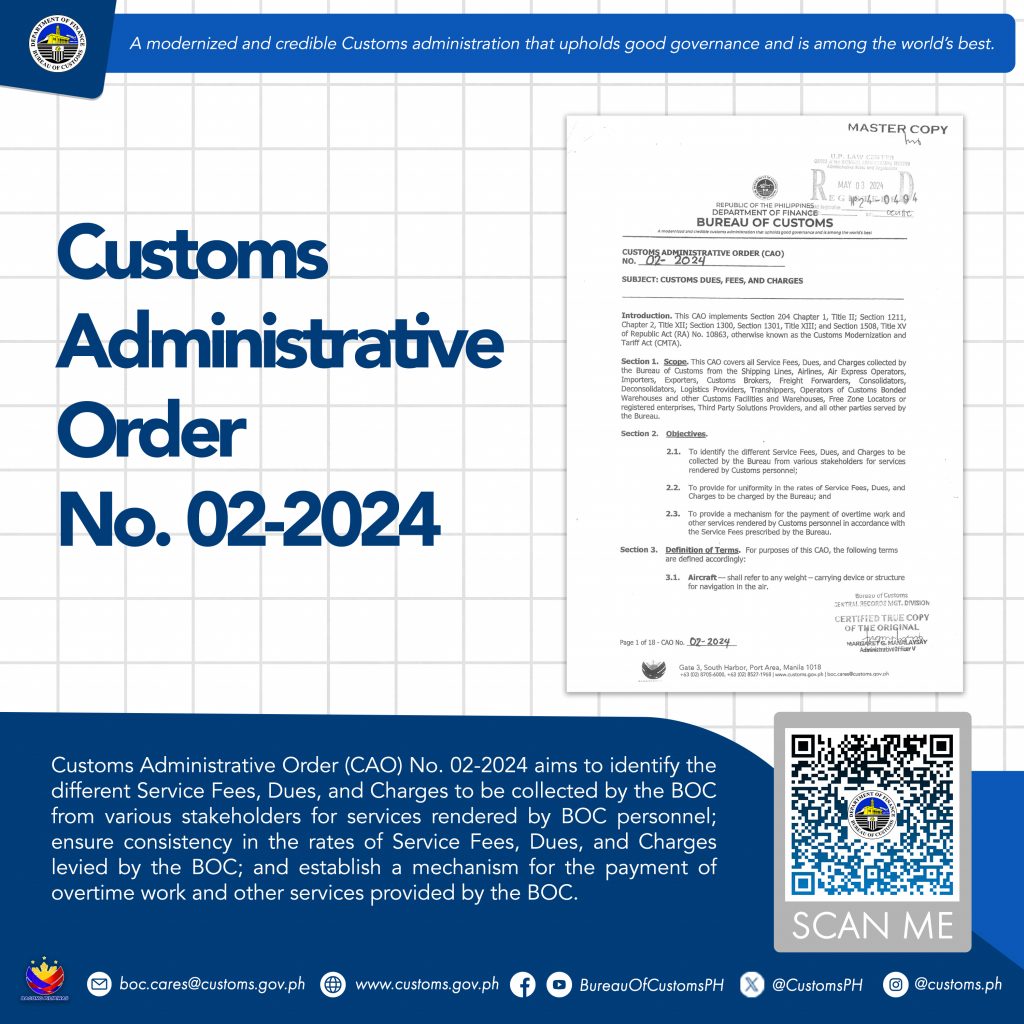- GOVPH
- About BOC
- Issuances
- Aduana Library
- Memoranda
- Memoranda for Reference Values
- Customs Administrative Order (CAO)
- Customs Administrative Order (CAO) 2025
- CUSTOMS ADMINISTRATIVE ORDER (CAO) 2024
- Customs Administrative Order (CAO) 2023
- Customs Administrative Order (CAO) 2022
- Customs Administrative Order (CAO) 2021
- Customs Administrative Order (CAO) 2020
- Customs Administrative Order (CAO) 2019
- Customs Administrative Order (CAO) 2018 and Older
- Customs Memorandum Order (CMO)
- Customs Memorandum Circular (CMC)
- Customs Memorandum Circular (CMC) 2025
- Customs Memorandum Circular (CMC) 2024
- Customs Memorandum Circular (CMC) 2023
- Customs Memorandum Circular (CMC) 2022
- Customs Memorandum Circular (CMC) 2021
- Customs Memorandum Circular (CMC) 2020
- Customs Memorandum Circular (CMC) 2019
- Customs Memorandum Circular (CMC) 2018 and Older
- Customs Special Order (CSO)
- Custom Training Circular (CTC)
- Joint Memorandum Orders (JMO)
- Trade
- News Room
- Port Updates
- HR Corner
- Quicklinks
- Infographics
- Bureau of Customs Webinar
- Auction and Sales
- Bid Opportunities
- Invitation to Bid / Request for Quotation / Invitation for Negotiated Procurement / Notice to Conduct Direct Contracting – 2023
- Invitation to Bid / Request for Quotation / Invitation for Negotiated Procurement / Notice to Conduct Direct Contracting – 2022
- Invitation to Bid / Request for Quotation / Invitation for Negotiated Procurement / Notice to Conduct Direct Contracting – 2021
- Invitation to Bid / Request for Quotation / Invitation for Negotiated Procurement / Notice to Conduct Direct Contracting – 2020
- Invitation to Bid / Request for Quotation / Invitation for Negotiated Procurement / Notice to Conduct Direct Contracting – 2019
- Invitation to Bid / Request for Quotation / Invitation for Negotiated Procurement / Notice to Conduct Direct Contracting
- Bid Documents
- Bid Supplement
- Summary of Awarded Contracts
- Summary of Contracts Awarded 2023
- Summary of Contracts Awarded 2022
- Summary of Contracts Awarded 2021
- Summary of Contracts Awarded 2020
- Summary of Contracts Awarded 2019
- Summary of Contracts Awarded 2018
- Summary of Contracts Awarded 2017
- Summary of Contracts Awarded 2016
- Summary of Contracts Awarded 2015
- Summary of Contracts Awarded 2014
- Summary of Contracts Awarded 2013
- Annual Procurement Plan
- Customs Knowledge Resources
- References
- Gender Equality and Diversity
- Philippine National Trade Repository
- Philippine Tariff Finder
- Authorized Economic Operator
BOC Issues Order Standardizing Customs Dues, Fees, and Charges
On 11 May 2024, the Bureau of Customs (BOC) officially published Customs Administrative Order (CAO) No. 02-2024, which aims to identify the different Service Fees, Dues, and Charges to be collected by the BOC from various stakeholders for services rendered by BOC personnel; ensure consistency in the rates of Service Fees, Dues, and Charges levied by the BOC; and establish a mechanism for the payment of overtime work and other services provided by the BOC.
The said CAO covers all Service Fees, Dues, and Charges to be collected by the BOC from Shipping Lines, Airlines, Air Express Operators, Importers, Exporters, Customs Brokers, Freight Forwarders, Consolidators, Deconsolidators, Logistics Providers, Transhippers, Operators of Customs Bonded Warehouses, Free Zone Locators, or registered enterprises, Third Party Solutions Providers, and all other entities served by the BOC.
Under the provisions of the said CAO, Service Fees collected will be channeled into a Trust Fund. This fund will be utilized for the payment of allowances and overtime services for Customs personnel. Among the services covered by these fees are vessel supervision, aircraft supervision, free zone locator supervision, annual supervision for Authorized Economic Operators, underguarding for transfers, off-hours services, special flight supervision, and various processing and storage fees.
On the other hand, Customs Dues and Charges will be collected separately and will accrue to the General Fund. These dues and charges encompass a wide range of transactions, including processing fees for goods declaration, balikbayan boxes, import and export transactions, appeals, legal opinions, accreditation charges, permit fees, registration charges, and service charges for document issuance and certification.
“The implementation of this Customs Administrative Order is a crucial step in furtherance of standardizing our fee structures and establishing clear guidelines on the collection of Customs Fees, Dues, and Charges,” said Commissioner Rubio. “We are doing this to establish uniformity, ensure transparency in our operations, and provide a mechanism for the payment of overtime work and other services delivered by the BOC.”
The CAO will take effect on 10 June 2024 or 30 days after its publication.###

ABOUT GOVPH
All content is in the public domain unless otherwise stated.






